Abstract
1 The relaxations induced by adenosine 5'-triphosphate (ATP), adenosine 5'-diphosphate (ADP), adenosine 5'-monophosphate (AMP) and adenosine on the carbachol-contracted taenia coli of the guinea-pig have been studied. ATP and ADP produce similar responses which differ in nature and time course from those of AMP and adenosine. 2 Theophylline, at concentrations (25-200 muM) lower than those which produce significant phosphodiesterase inhibition, blocks the effects of AMP and adenosine but fails to antagonize the responses elicited by ATP and ADP. The antagonism of adenosine by theophylline appears to be competitive. 3 Apamin (1-100 nM) blocks the inhibitory effects of ATP and ADP but fails to antagonize the responses to AMP and adenosine. The antagonism by apamin is non-competitive. 4 The results indicate that ATP and adenosine relax the taenia coli by activating different receptors and are consistent with the P1, P2 purinoceptor hypothesis.
Full text
PDF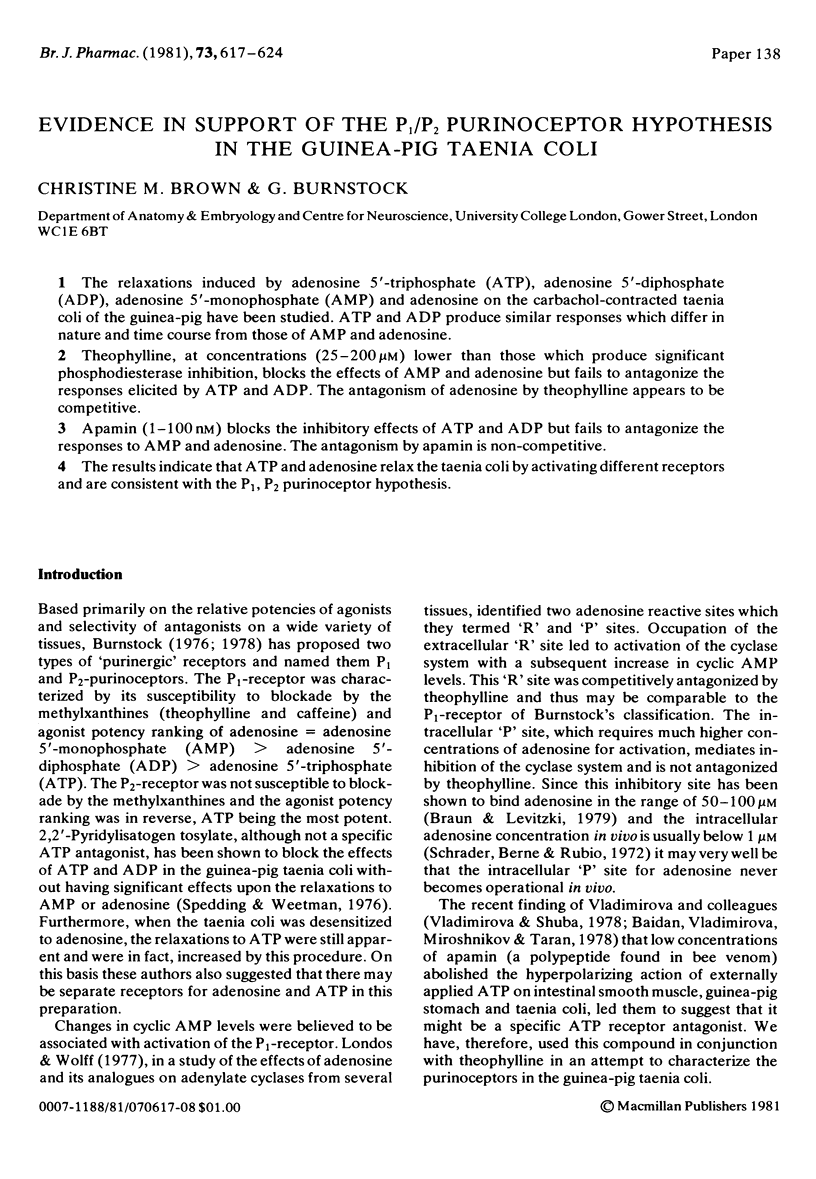
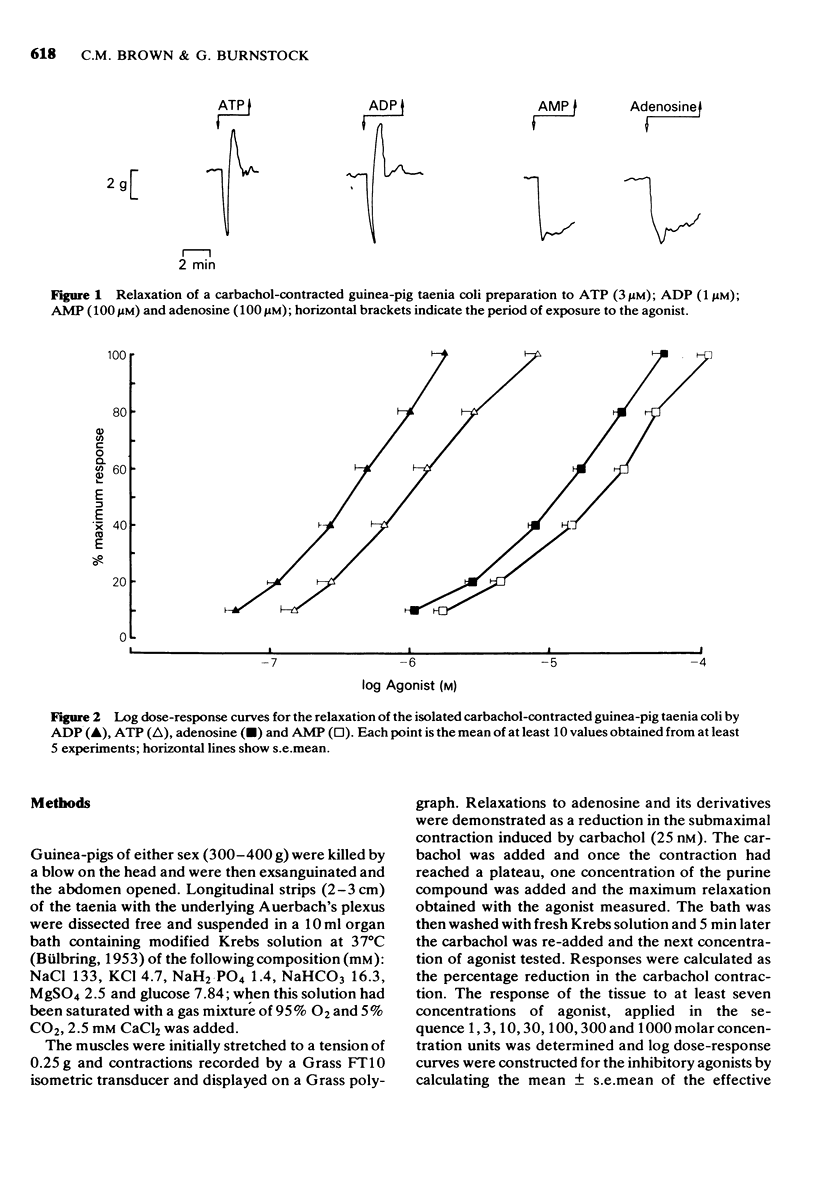
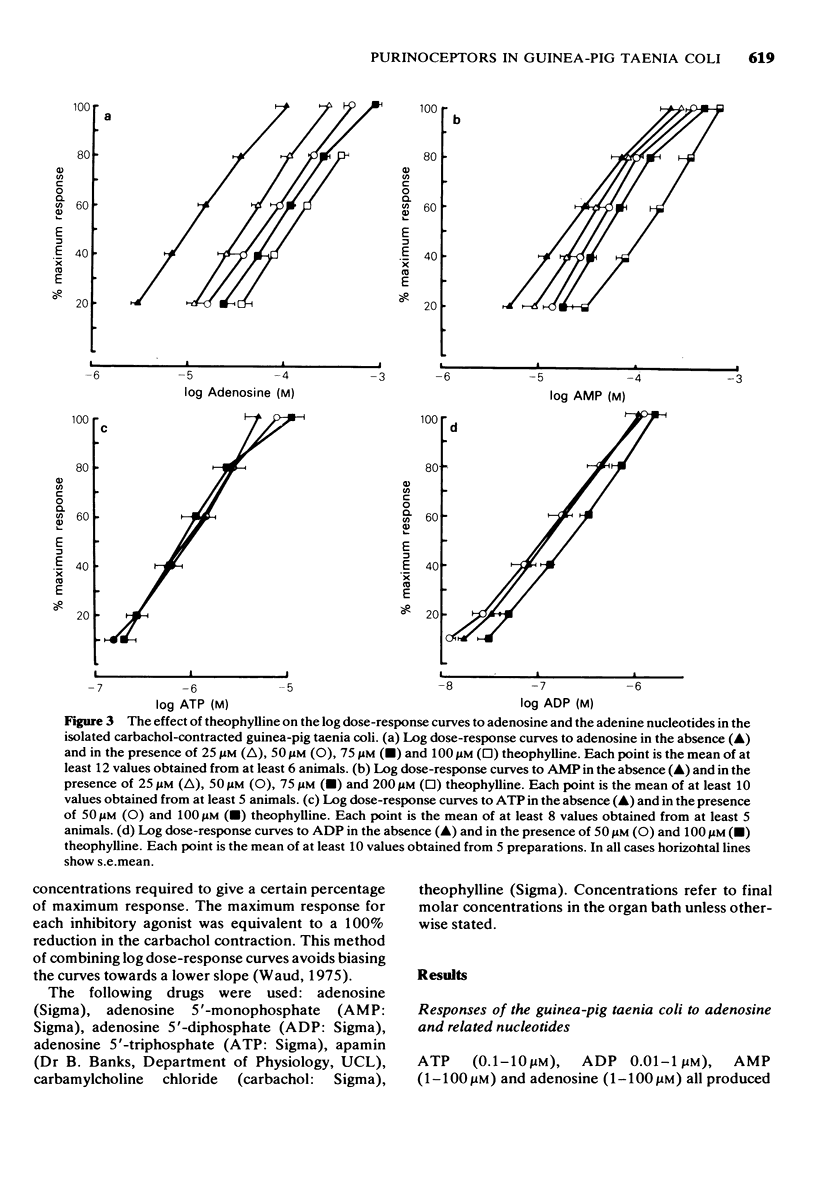
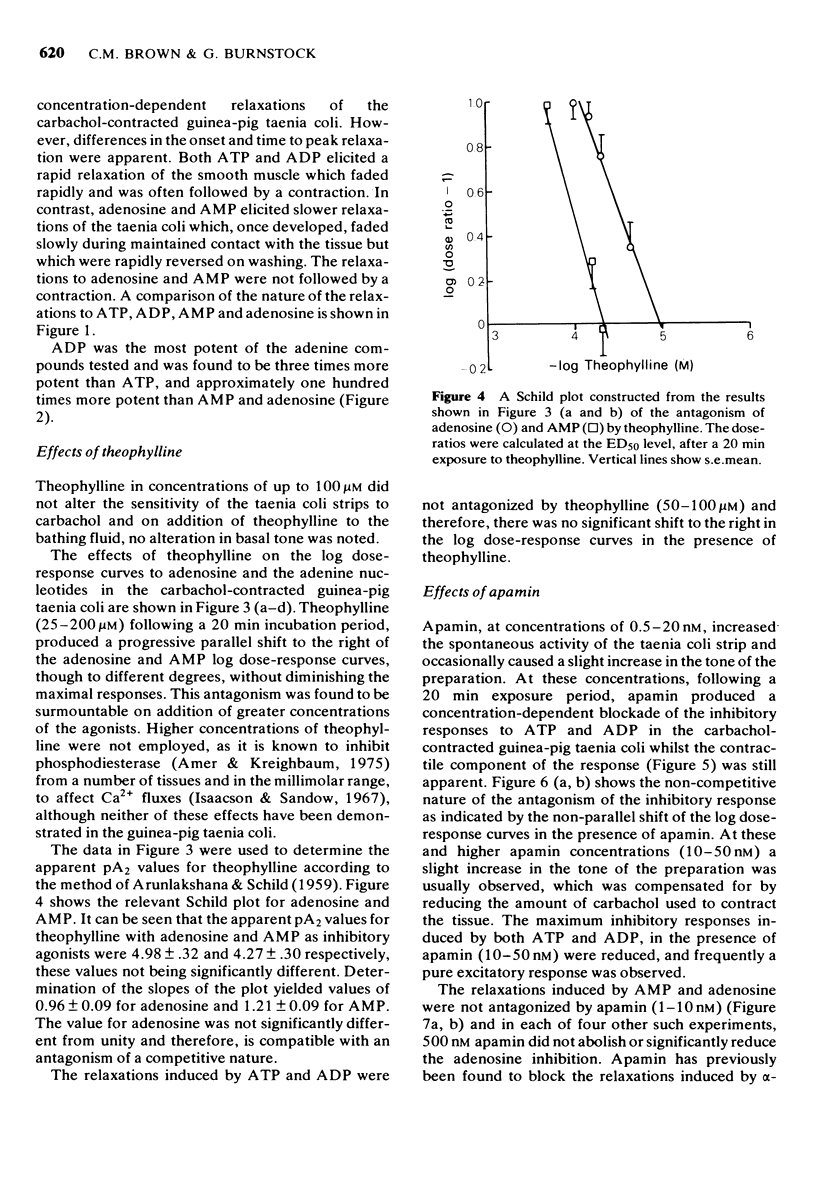
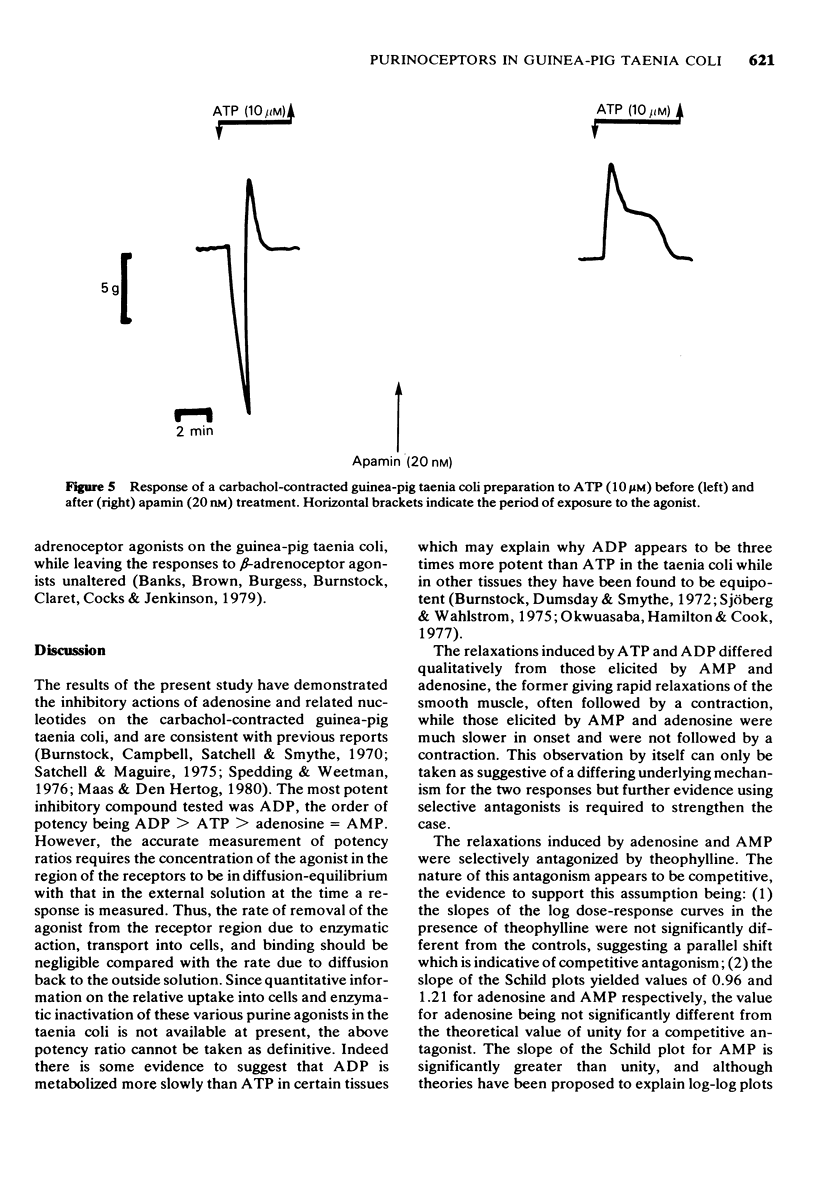
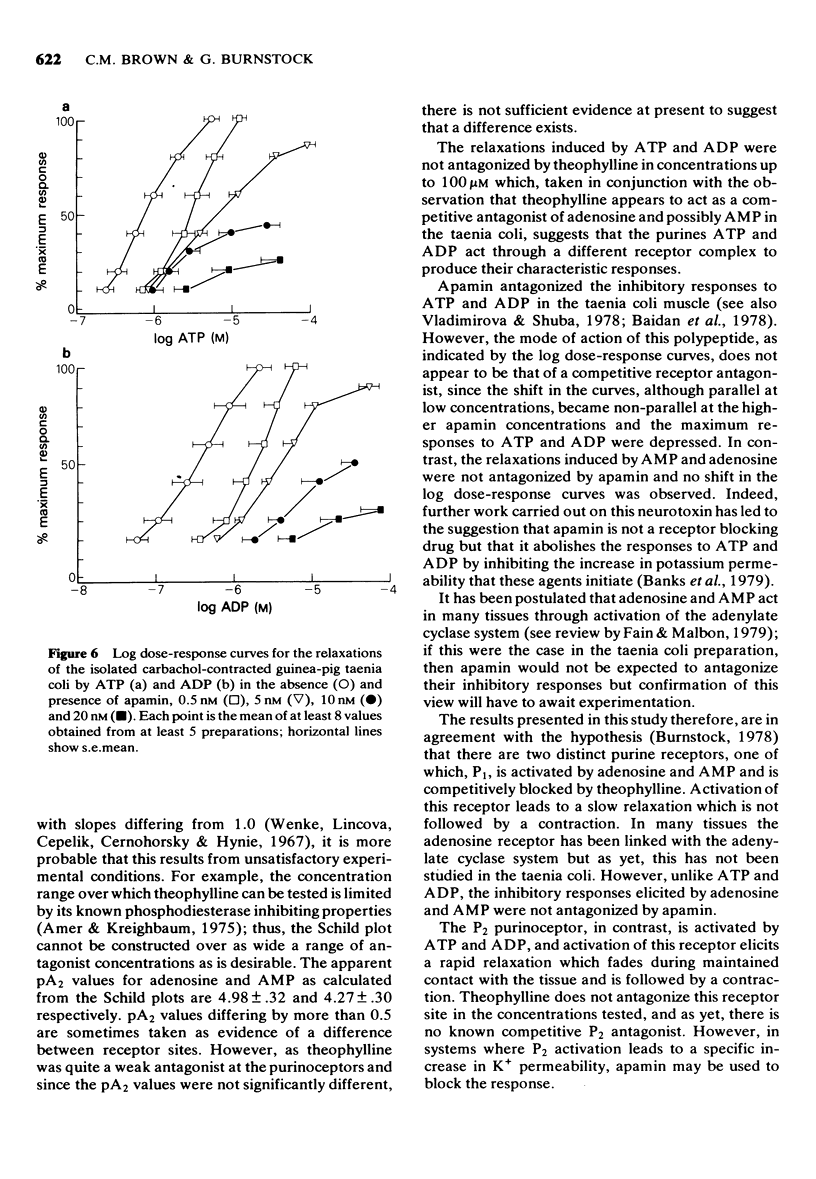
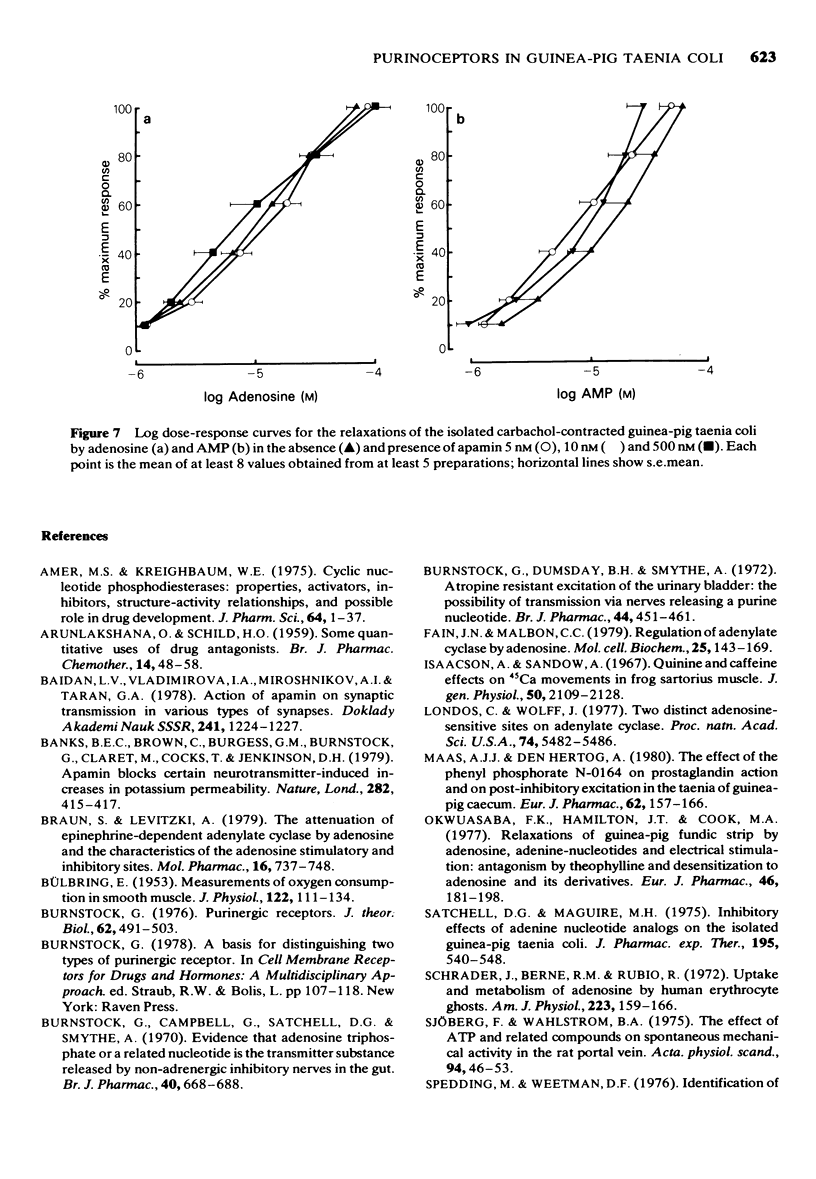

Selected References
These references are in PubMed. This may not be the complete list of references from this article.
- ARUNLAKSHANA O., SCHILD H. O. Some quantitative uses of drug antagonists. Br J Pharmacol Chemother. 1959 Mar;14(1):48–58. doi: 10.1111/j.1476-5381.1959.tb00928.x. [DOI] [PMC free article] [PubMed] [Google Scholar]
- BULBRING E. Measurements of oxygen consumption in smooth muscle. J Physiol. 1953 Oct;122(1):111–134. doi: 10.1113/jphysiol.1953.sp004983. [DOI] [PMC free article] [PubMed] [Google Scholar]
- Baidan L. V., Vladimirova I. A., Miroshnikov A. I., Taran G. A. Deistvie apamina na sinapticheskuiu peredachu v razlichnykh tipakh sinapsov. Dokl Akad Nauk SSSR. 1978 Aug 11;241(5):1224–1227. [PubMed] [Google Scholar]
- Banks B. E., Brown C., Burgess G. M., Burnstock G., Claret M., Cocks T. M., Jenkinson D. H. Apamin blocks certain neurotransmitter-induced increases in potassium permeability. Nature. 1979 Nov 22;282(5737):415–417. doi: 10.1038/282415a0. [DOI] [PubMed] [Google Scholar]
- Braun S., Levitzki A. The attenuation of epinephrine-dependent adenylate cyclase by adenosine and the characteristics of the adenosine stimulatory and inhibitory sites. Mol Pharmacol. 1979 Nov;16(3):737–748. [PubMed] [Google Scholar]
- Burnstock G., Campbell G., Satchell D., Smythe A. Evidence that adenosine triphosphate or a related nucleotide is the transmitter substance released by non-adrenergic inhibitory nerves in the gut. Br J Pharmacol. 1970 Dec;40(4):668–688. doi: 10.1111/j.1476-5381.1970.tb10646.x. [DOI] [PMC free article] [PubMed] [Google Scholar]
- Burnstock G., Dumsday B., Smythe A. Atropine resistant excitation of the urinary bladder: the possibility of transmission via nerves releasing a purine nucleotide. Br J Pharmacol. 1972 Mar;44(3):451–461. doi: 10.1111/j.1476-5381.1972.tb07283.x. [DOI] [PMC free article] [PubMed] [Google Scholar]
- Burnstock G. Purinergic receptors. J Theor Biol. 1976 Oct 21;62(2):491–503. doi: 10.1016/0022-5193(76)90133-8. [DOI] [PubMed] [Google Scholar]
- Fain J. N., Malbon C. C. Regulation of adenylate cyclase by adenosine. Mol Cell Biochem. 1979 Jun 15;25(3):143–169. doi: 10.1007/BF00235364. [DOI] [PubMed] [Google Scholar]
- Isaacson A., Sandow A. Quinine and caffeine effects on 45Ca movements in frog sartorius muscle. J Gen Physiol. 1967 Sep;50(8):2109–2128. doi: 10.1085/jgp.50.8.2109. [DOI] [PMC free article] [PubMed] [Google Scholar]
- Londos C., Wolff J. Two distinct adenosine-sensitive sites on adenylate cyclase. Proc Natl Acad Sci U S A. 1977 Dec;74(12):5482–5486. doi: 10.1073/pnas.74.12.5482. [DOI] [PMC free article] [PubMed] [Google Scholar]
- Maas A. J., Den Hertog A. The effect of the phenyl phosphonate N-0164 on prostaglandin action and on post inhibitory excitation in the taenia of guinea-pig caecum. Eur J Pharmacol. 1980 Mar 21;62(2-3):157–166. doi: 10.1016/0014-2999(80)90272-1. [DOI] [PubMed] [Google Scholar]
- Okwuasaba F. K., Hamilton J. T., Cook M. A. Relaxations of guinea-pig fundic strip by adenosine, adenine nucleotides and electrical stimulation: antagonsism by theophylline and desensitization to adenosine and its derivatives. Eur J Pharmacol. 1977 Dec 1;46(3):181–198. doi: 10.1016/0014-2999(77)90333-8. [DOI] [PubMed] [Google Scholar]
- Samir Amer M., Kreighbaum W. E. Cyclic nucleotide phosphodiesterases: properties, activators, inhibitors, structure--activity relationships, and possible role in drug development. J Pharm Sci. 1975 Jan;64(1):1–37. doi: 10.1002/jps.2600640106. [DOI] [PubMed] [Google Scholar]
- Satchell D. G., Maguire M. H. Inhibitory effects of adenine nucleotide analogs on the isolated guinea-pig taenia coli. J Pharmacol Exp Ther. 1975 Dec;195(3):540–548. [PubMed] [Google Scholar]
- Schrader J., Berne R. M., Rubio R. Uptake and metabolism of adenosine by human erythrocyte ghosts. Am J Physiol. 1972 Jul;223(1):159–166. doi: 10.1152/ajplegacy.1972.223.1.159. [DOI] [PubMed] [Google Scholar]
- Sjöberg B., WAHLSTRöm B. A. The effect of ATP and related compounds on spontaneous mechanical activity in the rat portal vein. Acta Physiol Scand. 1975 May;94(1):46–53. doi: 10.1111/j.1748-1716.1975.tb05860.x. [DOI] [PubMed] [Google Scholar]
- Spedding M., Weetman D. F. Identification of separate receptors for adenosine and adenosine 5'-triphosphate in causing relaxations of the isolated taenia of the guinea-pig caecum. Br J Pharmacol. 1976 Jun;57(2):305–310. doi: 10.1111/j.1476-5381.1976.tb07480.x. [DOI] [PMC free article] [PubMed] [Google Scholar]
- Vladimirova I. A., Shuba M. F. Vliianie strikhnina, gidrastina i apamina na sinapticheskuiu peredachu v gladkomyshechnykh kletkakh. Neirofiziologiia. 1978;10(3):295–299. [PubMed] [Google Scholar]
- Wenke M., Lincová D., Cepelík J., Cernohorský M., Hynie S. Some aspects of the action of beta adrenergic blocking drugs on adrenergic lipid mobilization. Ann N Y Acad Sci. 1967 Feb 10;139(3):860–878. doi: 10.1111/j.1749-6632.1967.tb41256.x. [DOI] [PubMed] [Google Scholar]


